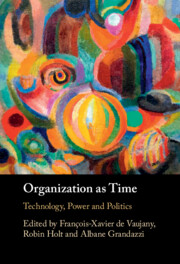Book contents
- Organization as Time
- Organization as Time
- Copyright page
- Contents
- Figures
- Tables
- Contributors
- Organization as Time
- Part I The Politics of Time: Ontologies and Metaphysics of Organization as Time
- Part II Re-orienting Critique in Organization Studies? Exploring Jointly Time and Politics
- Part III New Ways of Organizing Work, Digitality and the Politics of Time
- Part IV History and Duration: Making Things Last, Enduring Politics and Organizing
- Index
- References
Organization as Time
Power and Emancipation in the Happening of Management
Published online by Cambridge University Press: 22 June 2023
- Organization as Time
- Organization as Time
- Copyright page
- Contents
- Figures
- Tables
- Contributors
- Organization as Time
- Part I The Politics of Time: Ontologies and Metaphysics of Organization as Time
- Part II Re-orienting Critique in Organization Studies? Exploring Jointly Time and Politics
- Part III New Ways of Organizing Work, Digitality and the Politics of Time
- Part IV History and Duration: Making Things Last, Enduring Politics and Organizing
- Index
- References
Summary
As Virginia Woolf put it, clocks are machines that strike time. To strike is to hit, but also to found or yield, and in periodically referring to the bell Big Ben marking the hours in her novel Mrs Dalloway, Woolf attends to this intimacy between organization, sound and time passing. As the quarter hours are struck the civic, commercial, ritual and domestic rhythms of London unfold with a distinct yet mutually accommodating order.
- Type
- Chapter
- Information
- Organization as TimeTechnology, Power and Politics, pp. 1 - 10Publisher: Cambridge University PressPrint publication year: 2023



